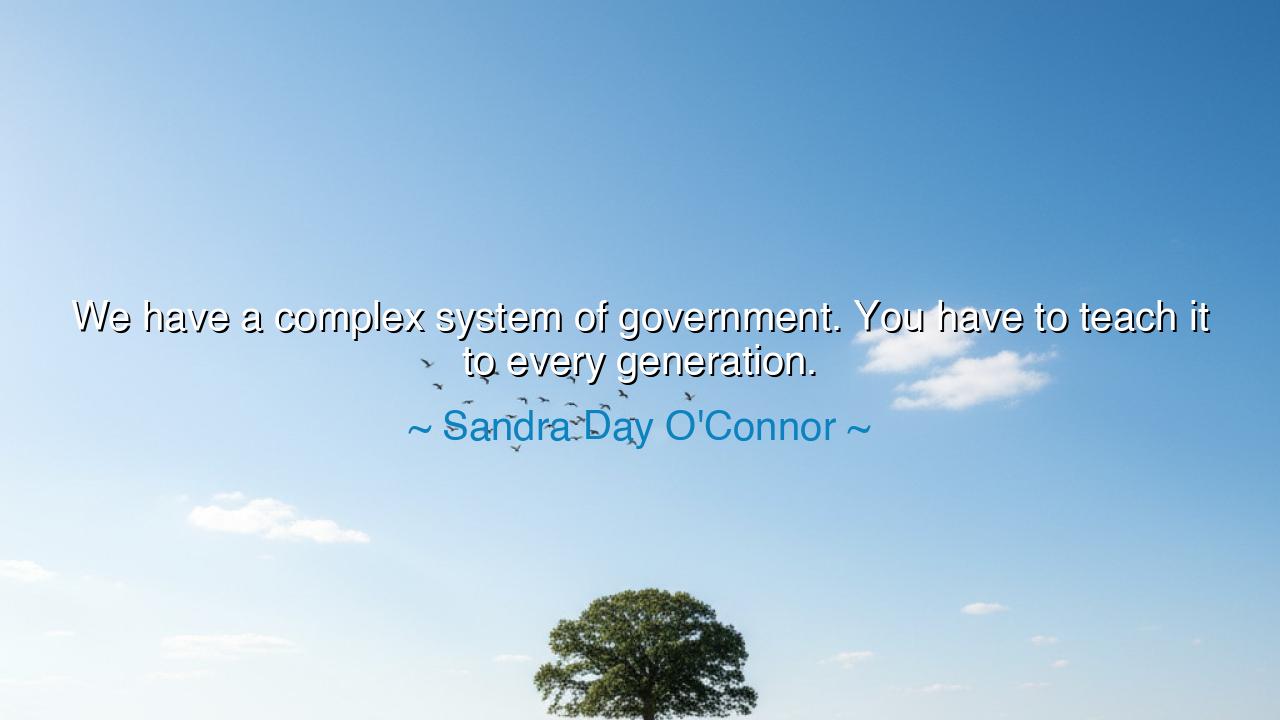
We have a complex system of government. You have to teach it to






The words of Sandra Day O’Connor, the first woman to serve on the Supreme Court of the United States, shine like a lantern held high in the gathering dusk: “We have a complex system of government. You have to teach it to every generation.” In these simple yet profound lines, she reminds us that liberty is not self-sustaining, nor is democracy self-explaining. The machinery of freedom—its laws, its balances, its quiet restraints—does not run on its own. It is powered by understanding. When knowledge fades, so too does freedom. And so O’Connor, with the wisdom of one who sat at the very heart of the Republic’s judicial conscience, called upon us to become teachers of what is sacred: the inheritance of self-government.
The origin of this quote lies in O’Connor’s deep concern for civic education. After retiring from the Supreme Court in 2006, she devoted herself to addressing a quiet but dangerous crisis—the fading knowledge of how the American system of government truly works. She had witnessed in her lifetime how citizens increasingly lost touch with the Constitution’s design: the separation of powers, the checks and balances, the fragile harmony between freedom and responsibility. To her, the Constitution was not just parchment sealed under glass—it was a living covenant between generations, one that must be renewed by teaching, discussion, and understanding. “If we don’t teach it,” she warned, “we risk losing it.” Her words echo through time as both a truth and a warning.
In the manner of the ancients, let us say that O’Connor spoke as the guardian of a great temple—the temple of law and reason. A temple stands only when its foundations are known and honored. But what happens when the children of the future forget the stones upon which it was built? The system of government, she says, is complex, not because it is tangled or deceitful, but because it reflects the complexity of human virtue and vice. It is a system built not on trust in rulers, but on restraint of power. It assumes imperfection in mankind, and therefore divides authority so that no one hand may grasp too much. To understand this balance is to understand civilization itself. To forget it is to invite tyranny or chaos.
Throughout history, the fall of republics has not come from sudden conquest, but from slow ignorance. The Roman Republic, that proud ancestor of all democratic dreams, perished not because of foreign armies, but because its citizens ceased to care how their government worked. The Senate became a theater for ambition, the people a mob for flattery. The intricate balance that once held Rome upright—its consuls, tribunes, and assemblies—was forgotten. Into that vacuum stepped Caesar, and the Republic died not with a battle, but with a cheer. Sandra Day O’Connor’s warning carries the same spirit as the philosophers of old: when citizens forget the workings of their freedom, they lose the habit of defending it.
In her later years, O’Connor founded iCivics, a program to teach young Americans about the structure and purpose of their government. She knew that no generation is born with understanding; it must be taught anew. For democracy, unlike monarchy, does not pass through bloodlines—it passes through minds. Each generation must learn, must question, must renew the promise made by their forebears. The laws may remain the same, but the comprehension of those laws must be reborn in every heart. “You have to teach it,” she said, for she knew that ignorance is the slow poison of freedom.
And yet, O’Connor’s words are not a lament—they are a call to duty. To teach government is not merely to explain its structure; it is to awaken reverence for justice, curiosity for truth, and respect for the rule of law. Parents, teachers, and leaders must become keepers of this flame, passing it from one generation to the next. To do otherwise is to allow darkness to fall quietly, as ignorance spreads where wisdom once lived. For what good is a Constitution unread, or a vote cast without understanding? The citizen who does not know his rights cannot defend them; the child who does not learn the past cannot protect the future.
So, my children of the future, take this lesson as sacred: freedom must be taught, or it will be forgotten. Do not assume that liberty, once won, will endure without care. Learn how your government works—not as a distant institution, but as a living reflection of yourselves. Study the balance of powers, honor the limits of authority, and cherish the law not as a cage, but as the framework that keeps justice upright. Each of you is both student and guardian of the Republic.
For as Sandra Day O’Connor taught, the greatness of democracy lies not in its leaders, but in its learners. It is a complex system, yes—but it was designed so that any citizen, if willing to learn, might rule wisely. Teach it, therefore, in your homes, your schools, your hearts. Teach it as you would teach the names of your ancestors, for it is your inheritance. And in that teaching, the Republic shall live—not as a relic of parchment and marble, but as a living flame, burning ever bright across the generations of free men and women.






AAdministratorAdministrator
Welcome, honored guests. Please leave a comment, we will respond soon